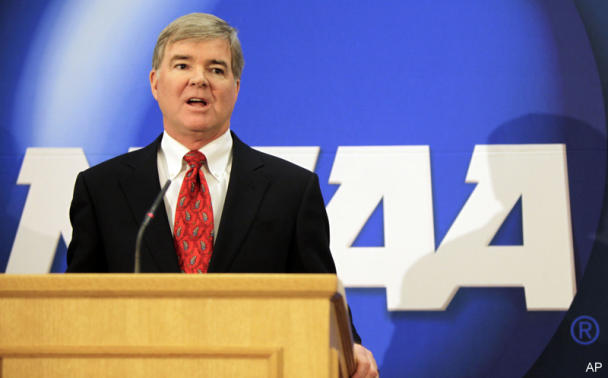One day after PBS skewered the NCAA for not sufficiently compensating the players who help make March Madness profitable, NCAA president Mark Emmert said it's time his organization reassess its stance on that oft-debated issue.
Emmert told USA Today that he sees merit in increasing the value of players' scholarships by a few thousand dollars to pay for travel, laundry and other day-to-day expenses that currently aren't covered. He isn't guaranteeing anything will change, but he said that he'll bring up the idea at the next set of NCAA board meetings in April.
A small extra stipend certainly won't satisfy critics who suggest top players should be paid lavishly for their role in raking in TV rights money and merchandise sales, but it does represent a departure from the NCAA's previous stance. The NCAA has long maintained that to protect the principles of amateurism, college athletes should not be compensated aside from scholarships that cover tuition, room and board, and little else.
The problem with the PBS segment is that it identified a problem yet offered little in the way of a practical solution.
What critics of the current system often neglect is that the money generated by college basketball's NCAA tournament goes to help schools fund non-revenue sports like soccer, volleyball or track and field. If the revenue March Madness produces were used to pay college basketball players, cash-strapped universities would have to find another way to fund these other sports or they'd have to cut them entirely.
Furthermore, determining which athletes to pay and how much to pay them would be a nightmarish process.
Do you only pay athletes in revenue-producing sports like football, men's basketball and in some cases hockey or women's basketball? Do you pay the star point guard and the 11th man off the bench equally? Does the money come from the universities, or should the NCAA simply make it legal for agents to compensate the players with pro potential whom they hope to one day sign as clients?
Most everyone can agree that Michigan shouldn't be selling Chris Webber jerseys without him seeing some of the profit. The challenge of how to fix the system is a complex one to which there are few perfect solutions.
Sara Spraker Alexis Bledel Kim Kardashian China Chow Alecia Elliott

No comments:
Post a Comment